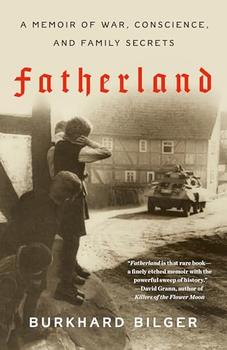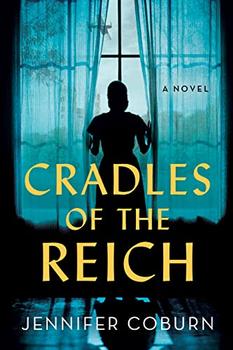Summary | Excerpt | Reading Guide | Reviews | Beyond the book | Read-Alikes | Genres & Themes | Author Bio

Motherland is set in Germany during the final months of World War II. The plot centers around the Kappus family: Frank, a reconstructive surgeon drafted into service; Liesl, his young second wife left behind to care for Frank's family; Hans, Frank's eldest son, still mourning the death of his mother and resentful of his new stepmother; and Ani, Hans's frail younger brother. Hummel illustrates the trials the family faces as the Third Reich crumbles around them, particularly Liesl's attempts to keep her stepchildren safe in the face of increasingly dire circumstances.
The novel is not the first to focus on how the war impacted the common citizens of Germany – those who weren't involved in the decisions made by their government but who generally did support Hitler, at least initially. Hummel devotes little space to the atrocities the Nazis committed - the horrors of the Holocaust, their eugenics program or Germany's unprovoked invasions of neighboring countries. She instead highlights the initial optimism and pride of the populace and, later, a growing disillusionment with the leaders as it became obvious they would not win the war. Liesl exemplifies this changing attitude, transitioning from someone who avidly follows Hitler's speeches and agrees with the party line completely to a woman just trying to keep her family alive and together. Interestingly, Hummel doesn't portray her characters as believing that the Nazis did anything wrong; she merely has them display awareness that they are on the losing side of the conflict and hence must suffer the consequences. It's an unusual approach to writing historical fiction about WWII Germany, which works very well here. The heroine comes across as a less sympathetic character but also more human and more truly representative of the attitudes of most German citizens.
Hummel's prose is beautifully descriptive as she expertly captures everyday life in a city in the midst of an encroaching war – the bombings, the deprivations and the impacts on the emotional life of the children in the area. The stress people are under in those circumstances is intense, and the author is able to convey the tension with marvelous realism.
When Liesl heard the noise from the cellar, her hand shook and the coffee spilled. The liquid spread in claws across the counter, its color neither brown nor red nor black, but some combination of all three, earthen and old. A hopeless feeling rose in her chest. She had discovered the grounds deep in the pantry yesterday, tucked behind a post, in a tiny tin next to a tiny pot of jam, both labeled in the first wife's hand. It was surely the last real coffee in all of Hannesburg, boiled with the last of the morning coal, the sharp selfish heaven of its scent rising toward her face. Then it splashed everywhere.
The author's characterizations are also spot on. Hans is perfectly drawn as a ten-year-old confused by the near-constant changes consuming his life and in particular about his conflicted feelings regarding his new stepmother. Liesl, too, is very convincing as a woman in crisis just barely keeping herself from falling apart for the sake of the boys in her care.
While I enjoyed the novel very much, I feel that the author's choice about what to include (or exclude) in the narrative weakens its impact substantially. There are, for example, several chapters devoted to Frank's work as a reconstructive surgeon that, while interesting, add little to the plot. Also, there is ongoing concern throughout the story that Ani will be sent to the infamous psychiatric hospital, Hadamar, but that plot line is under-developed, touching only a bit on the implications of being a "patient" at the facility. In addition, the last fifty pages of the novel are a mere summary of what the family endured in the months after the Americans entered their city. I wanted more information and was disappointed that after the depth of the earlier chapters this section was so brief.
That quibble aside, Motherland is excellent historical fiction that puts a slightly different take on a well-known era. Hummel's characterizations, rich descriptions and portrayal of a city in wartime make this one a good choice for anyone who enjoys WWII novels. It is also a suitable selection for book groups, with many topics that could spark an animated discussion.
![]() This review was originally published in The BookBrowse Review in January 2014, and has been updated for the
January 2015 edition.
Click here to go to this issue.
This review was originally published in The BookBrowse Review in January 2014, and has been updated for the
January 2015 edition.
Click here to go to this issue.

If you liked Motherland, try these:

by Burkhard Bilger
Published 2024
A New Yorker staff writer investigates his grandfather, a Nazi Party Chief, in this "unflinching, gorgeously written, and deeply moving exploration of morality, family, and war" (Patrick Radden Keefe, author of Empire of Pain).

by Jennifer Coburn
Published 2023
Three women, a nation seduced by a madman, and the Nazi breeding program to create a so-called master race.
Your guide toexceptional books
BookBrowse seeks out and recommends the best in contemporary fiction and nonfiction—books that not only engage and entertain but also deepen our understanding of ourselves and the world around us.